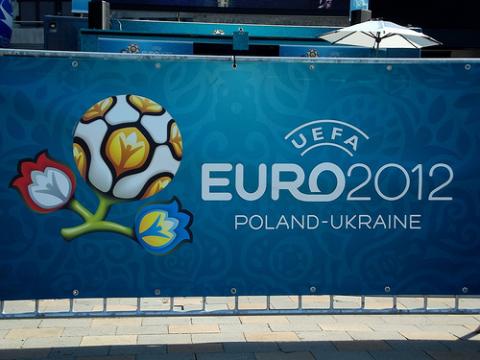Europhoria-2012

Having successfully passed the ‘Stability’ Treaty referendum, the Irish people can now turn to the serious business of the summer – Euro 2012. The low turnout in the referendum says much about the general apathy and confusion of the Irish public at a time of great economic distress, but relief is just around the corner.
Never underestimate the capacity of ‘bread and circuses’ to deflect the national attention away from its current woes. The ancient Romans realised it, and savvy governments ever since have recognised the ‘safety valve’ effect of sport upon a depleted national consciousness. Few can forget the positive effect of Italia ’90 on Ireland’s mood at the time. Harold Wilson even put his success in the 1966 British General Election in part down to England’s victory in that year’s World Cup. Argentina’s military junta milked its 1978 World Cup victory for all it was worth to deflect attention from the cruelties and incompetencies of its domestic record.
Nearer to home, at the height of our Celtic Tiger years, our beloved Bertie, with Ceaucescu-like grandiosity, proposed to visit upon the Irish people a new all-purpose sports stadium at Abbotstown. This was less to hide any perceived iniquities in our governance at the time (although in retrospect, he may have been well-advised to have done so!), but more to celebrate our Celtic Tiger success.
Few can doubt that the level of attention among the general public focused on Euro 2012 will surpass the level of interest in the recent referendum. The competitive simplicities of 22 men attempting to put a ball in the opposition’s net, combined with the sulphur of sustained inter-nation rivalry, should be enough to stoke the fires of interest in Ireland this summer. Given all the nation has gone through for the past few years, and the fact that Ireland hasn’t been involved in a major international football competition for a decade, it would be churlish to deny people such a pleasure. It won’t make our economic difficulties disappear, but it is an example of the vital ‘sweetener’ without which life loses glamour and meaning. An element of this also featured during the visits of the Queen of England and President Obama in 2011, not long after our national bailout was agreed. Expect a similar spirit to emerge during Euro 2012 when our national propensity for the ‘craic’ should come to the fore. Sackcloth and ashes is uncomfortable attire for anyone to wear indefinitely.
Paradoxically, sport has a way of both diluting and heightening the differences between nations. The Prussian military strategist, Carl von Clausewitz, said war is politics by other means. In the current era, this could be translated into ‘sport is war by other means’. Containing fierce international rivalries through the constructive alternative of sport is obviously a healthier option. Get rid of those aggressive energies on the football pitch or in the stands and you assuage any desire to send tanks into the territories of your nearest neighbours, it is hoped. Yet, those international rivalries remain and are certain to persist. Are the negative memories of English football fans of World War II and the Falklands/Malvinas invasion muted or intensified by England being defeated by Germany and Argentina in international football competitions? It would be hard to argue against their intensification, whatever one’s belief in the ‘brotherly love’ aspects of international sport. Sport, as we have seen, has its healthy aspects, but equally its unhealthy ones.
Some unhealthy aspects of sport likely to be on display in Poland and the Ukraine this summer are racism and xenophobia. Recent investigative reports have highlighted strong evidence of these strains on the football stands in both societies. Former England defender Sol Campbell has even advised against people of Afro-Carribbean descent travelling to the tournament out of fear for their safety, while the British Foreign office advises that “travellers of Asian or Afro-Caribbean descent and individuals belonging to religious minorities should take extra care." Linked with this is the persistence of anti-semitism in both countries. If trying to contain intense German/Dutch and English/German rivalries was not enough for UEFA to cope with, they now have the added feature of racism in the host nations to contend with.
Maybe, the Euro 2012 championships are simply a microcosm of the tensions and rivalries at a geopolitical level. Yet, few will doubt that the championships will provide a much-needed opportunity for the Irish (and others) to have a few weeks of fun and entertainment at a time of economic gloom and uncertainty. “Jaw-jaw is better than war-war,” according to Winston Churchill. At a time of hostility towards Europe, and Germany in particular, letting off steam on the football terraces, or with a few cans in front of a large screen, is perhaps a small price to pay to maintain peace and stability across Europe as a whole. {jathumbnailoff}
Image top: DrabikPany.
